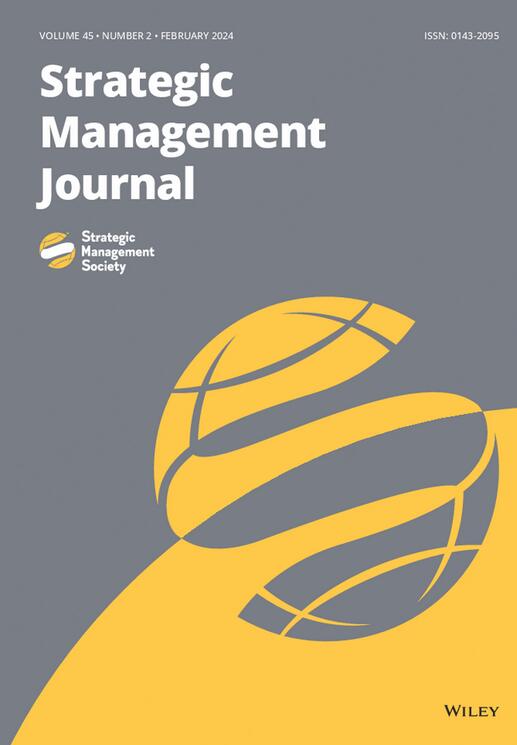Economic nationalism and the home court advantage
IF 7.2
1区 管理学
Q1 BUSINESS
引用次数: 0
Abstract
Research SummaryPolitical and regulatory actors routinely adopt or enforce policies to protect domestic firms at the expense of foreign firms. However, since courts are expected to be neutral and act independently, a question arises whether (and why) they discriminate against foreign firms. We argue that the courts are nationalistic, which emanates from judges differentiating between in‐group (domestic) and out‐group (foreign) members. In a sample of 58,754 patent disputes adjudicated by US federal district courts between 1983 and 2016, we find domestic patent holders and challengers are more successful than their foreign counterparts. Rulings involving foreign firms are more likely to exhibit nationalistic rhetoric. Judicial ideology moderates the differential odds of success between domestic and foreign firms. Thus, the legal system is another source of economic nationalism.Managerial SummaryMultinational firms might face a disadvantage relative to domestic firms because politicians and regulators are nationalistic; they routinely adopt policies that favor domestic firms. If courts are neutral, this disadvantage should not exist in litigation between multinational and domestic firms. On the contrary, if courts are also nationalistic, domestic firms should enjoy an advantage and greater success than multinational firms in judicial verdicts. Using data on patent disputes in the United States observed over a 33‐year period, we find domestic patent holders and challengers are more successful than their foreign counterparts suggesting that the legal system is another source of economic nationalism. Rulings involving multinationals are more likely to exhibit nationalistic rhetoric. Judicial ideology moderates the differential odds of success between domestic and multinational firms.经济民族主义和主场优势
研究摘要政治和监管机构通常会采取或执行保护本国公司的政策,从而损害外国公司的利益。然而,由于人们期望法院保持中立并独立行事,因此出现了法院是否(以及为何)歧视外国公司的问题。我们认为,法院是民族主义的,这源于法官对集团内(国内)和集团外(国外)成员的区别对待。在美国联邦地区法院于1983年至2016年间裁决的58754起专利纠纷样本中,我们发现国内专利持有人和质疑者比外国专利持有人和质疑者更容易胜诉。涉及外国公司的裁决更有可能出现民族主义言论。司法意识形态调节了国内企业和外国企业之间的成功几率差异。因此,法律制度是经济民族主义的另一个来源。管理总结跨国公司相对于国内公司可能会面临劣势,因为政治家和监管者都有民族主义倾向;他们通常会采取有利于国内公司的政策。如果法院是中立的,那么在跨国公司与国内公司之间的诉讼中就不应该存在这种劣势。相反,如果法院也是民族主义的,那么在司法判决中,国内企业应该比跨国企业享有优势和更大的成功。通过观察美国 33 年来的专利纠纷数据,我们发现国内专利持有人和异议人比外国专利持有人和异议人更容易胜诉,这表明法律制度是经济民族主义的另一个来源。涉及跨国公司的裁决更有可能出现民族主义言论。司法意识形态调节了国内公司和跨国公司之间的成功几率差异。
本文章由计算机程序翻译,如有差异,请以英文原文为准。
求助全文
约1分钟内获得全文
求助全文
来源期刊

Strategic Management Journal
Multiple-
CiteScore
13.70
自引率
8.40%
发文量
109
期刊介绍:
At the Strategic Management Journal, we are committed to publishing top-tier research that addresses key questions in the field of strategic management and captivates scholars in this area. Our publication welcomes manuscripts covering a wide range of topics, perspectives, and research methodologies. As a result, our editorial decisions truly embrace the diversity inherent in the field.
 求助内容:
求助内容: 应助结果提醒方式:
应助结果提醒方式:


